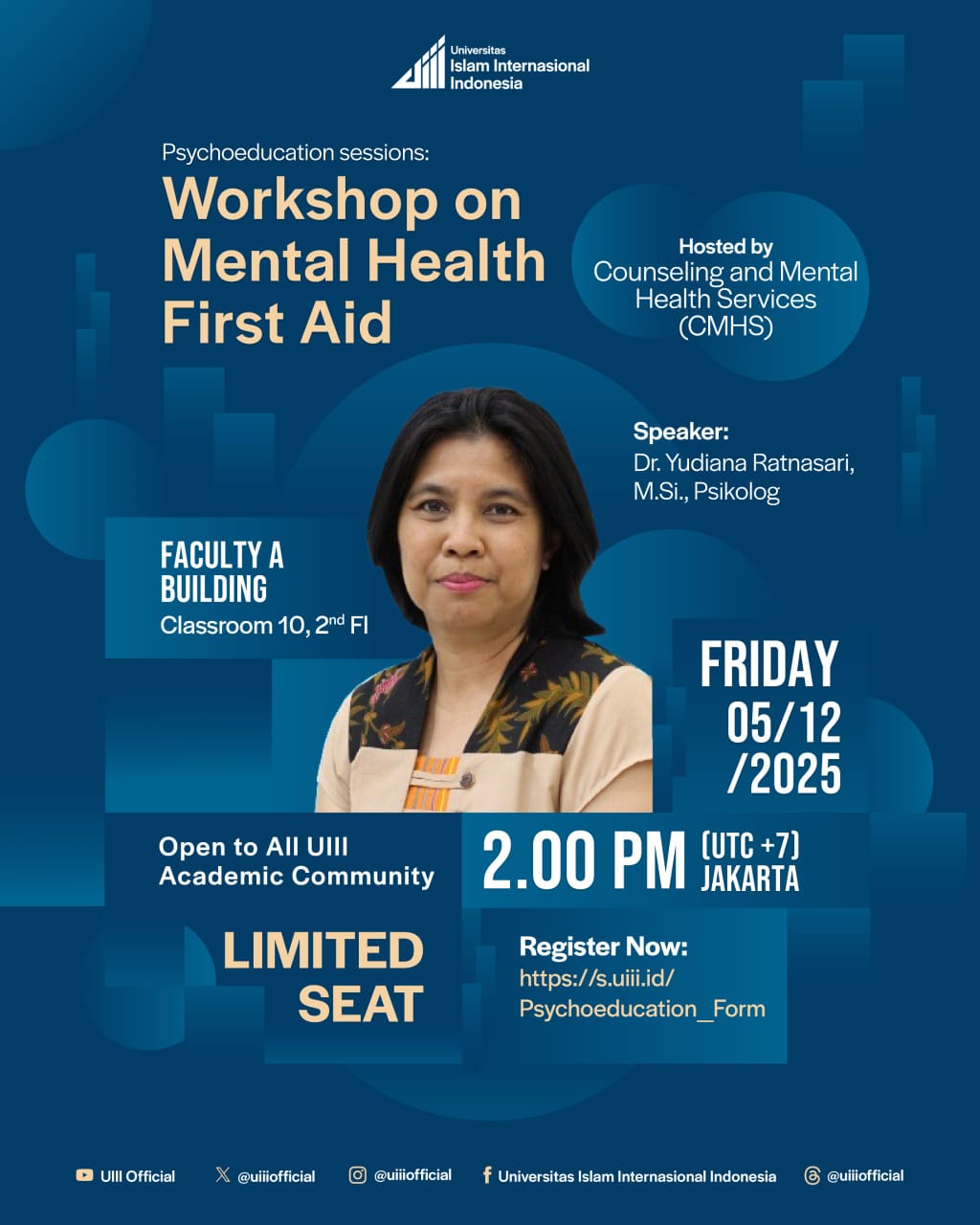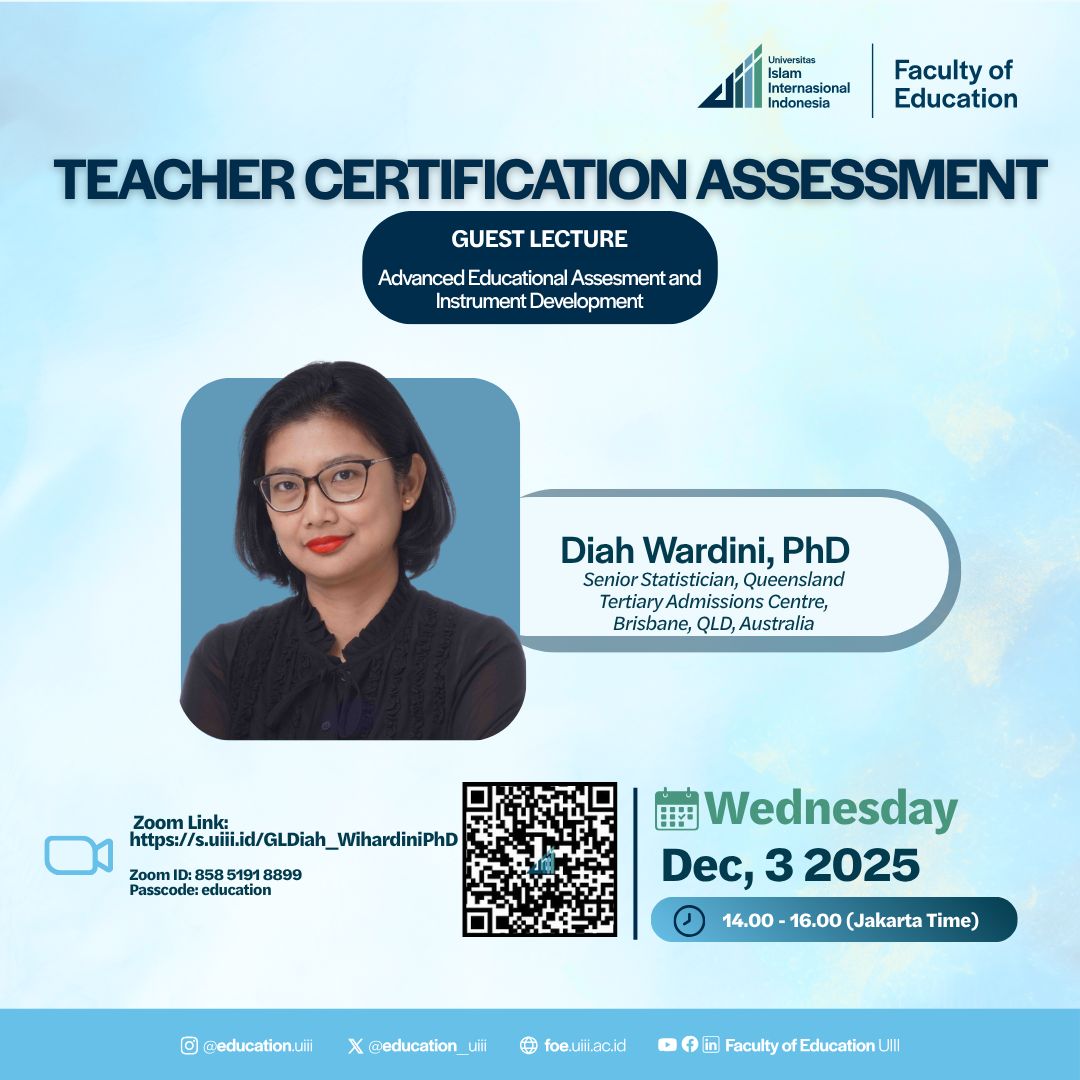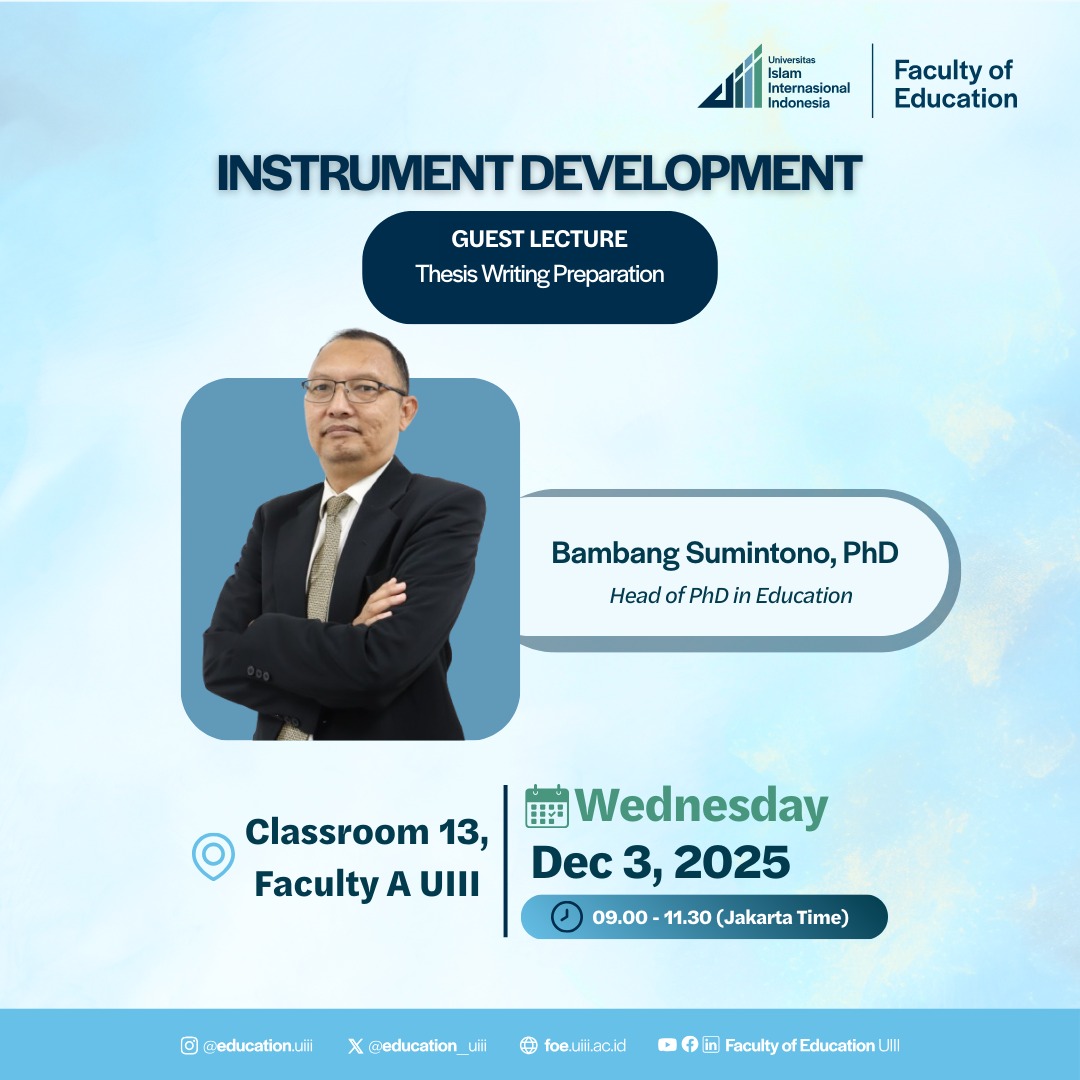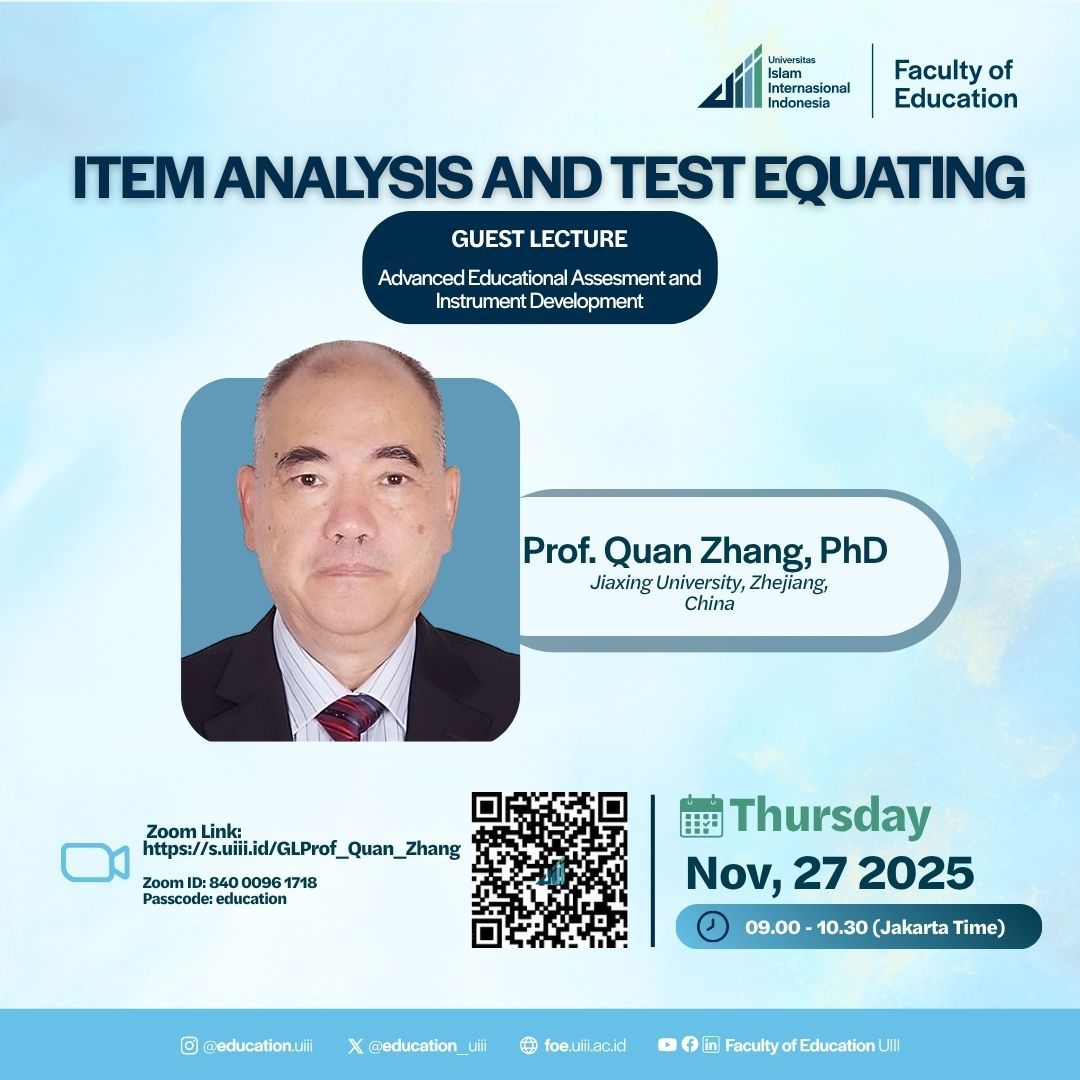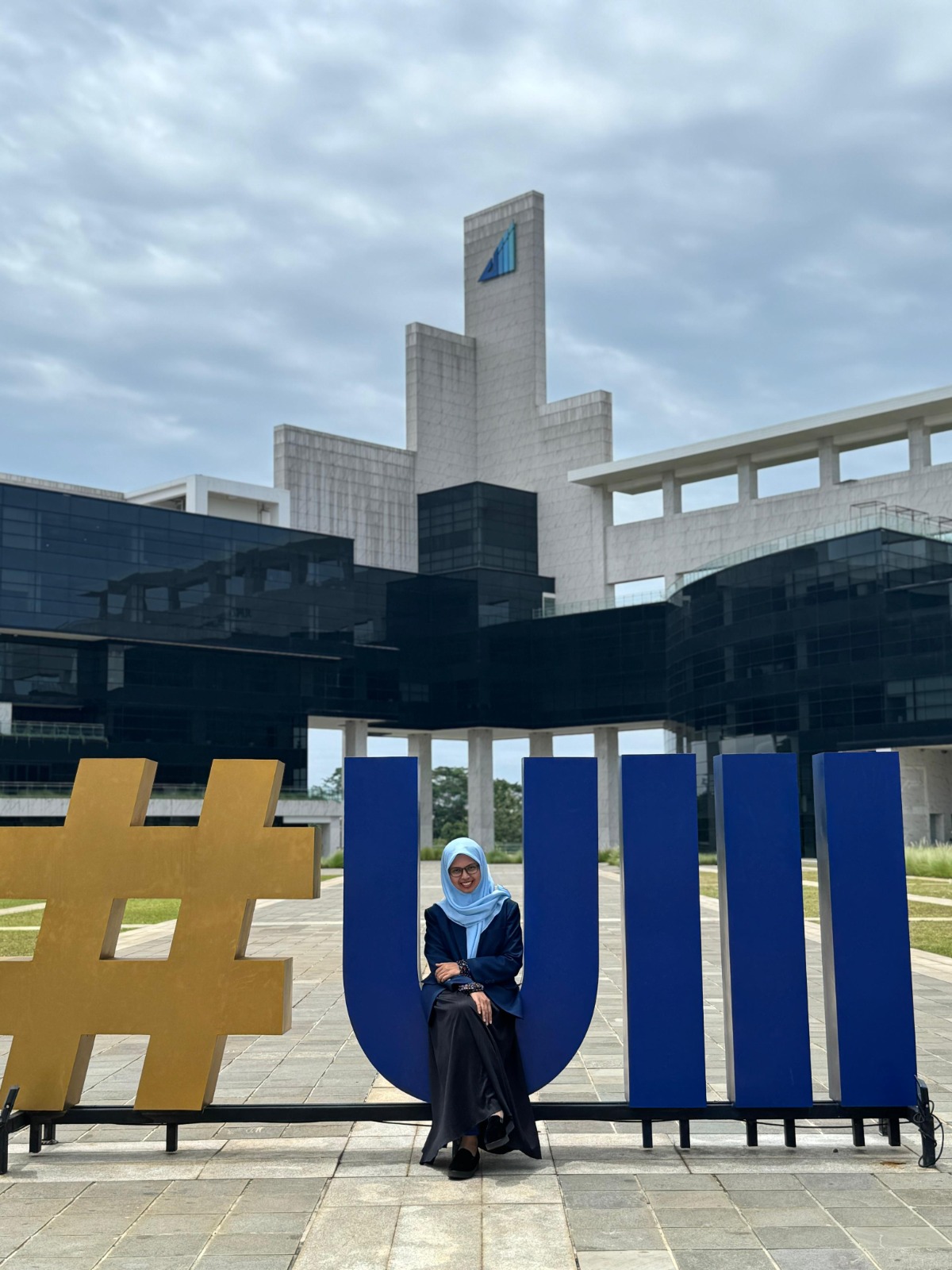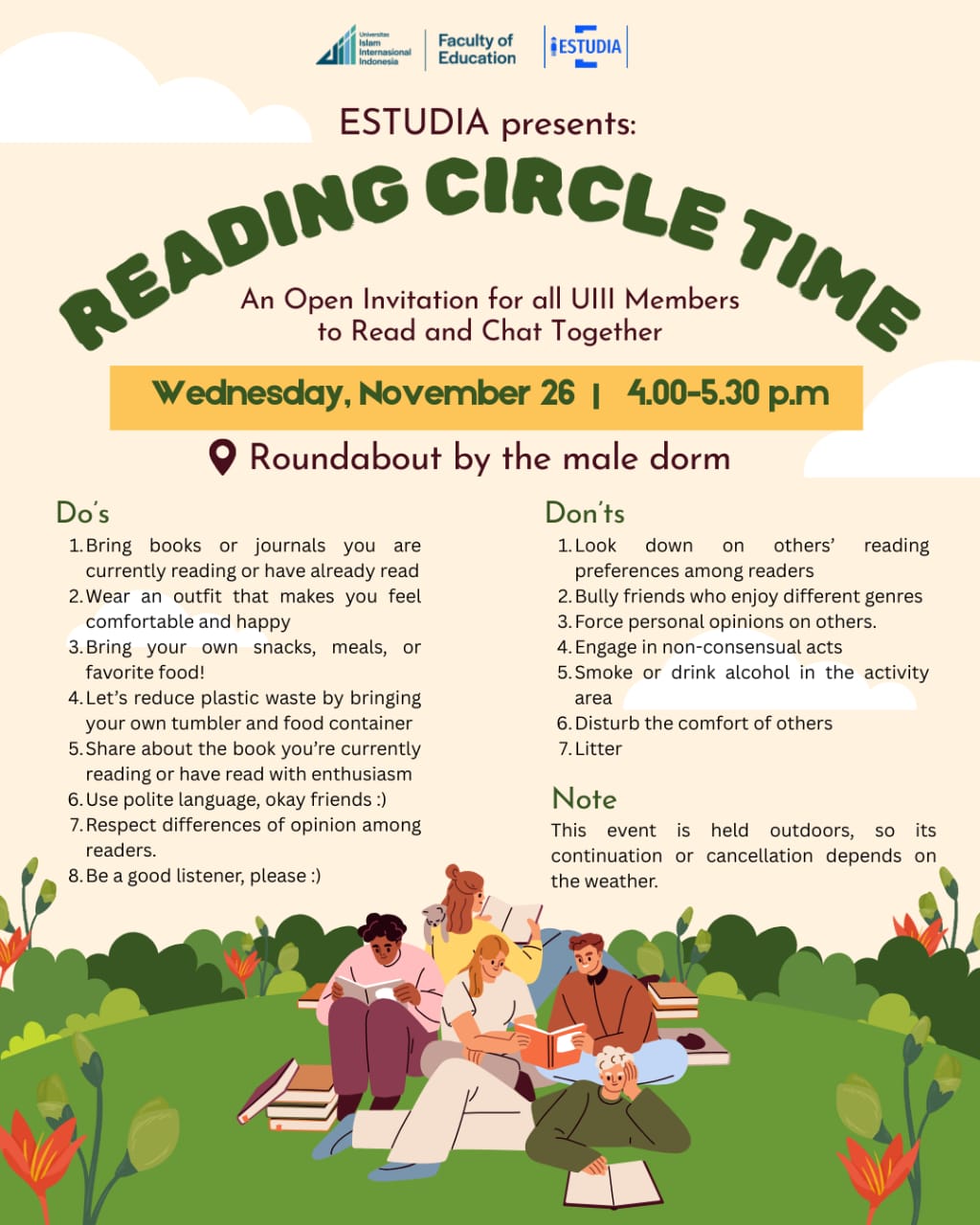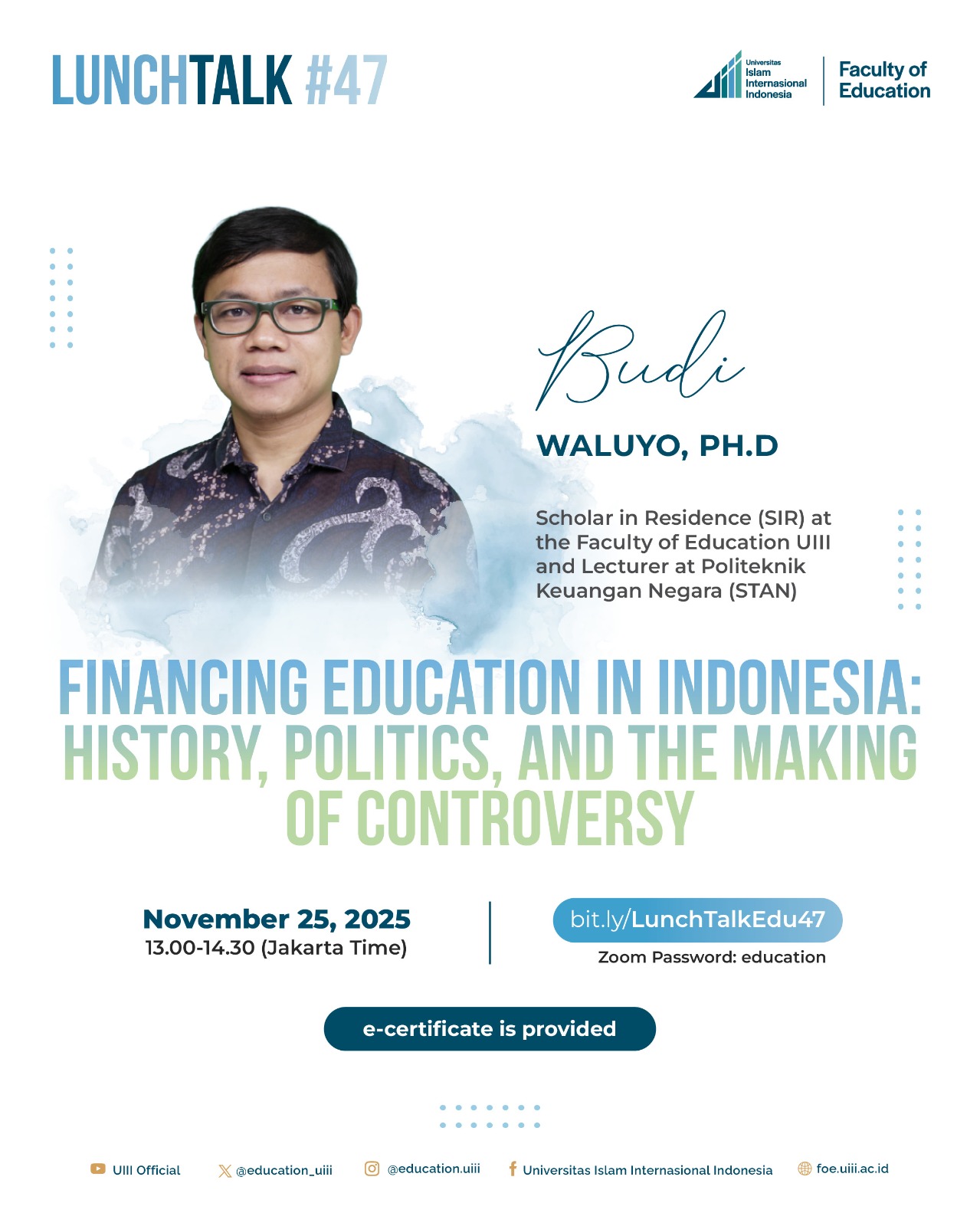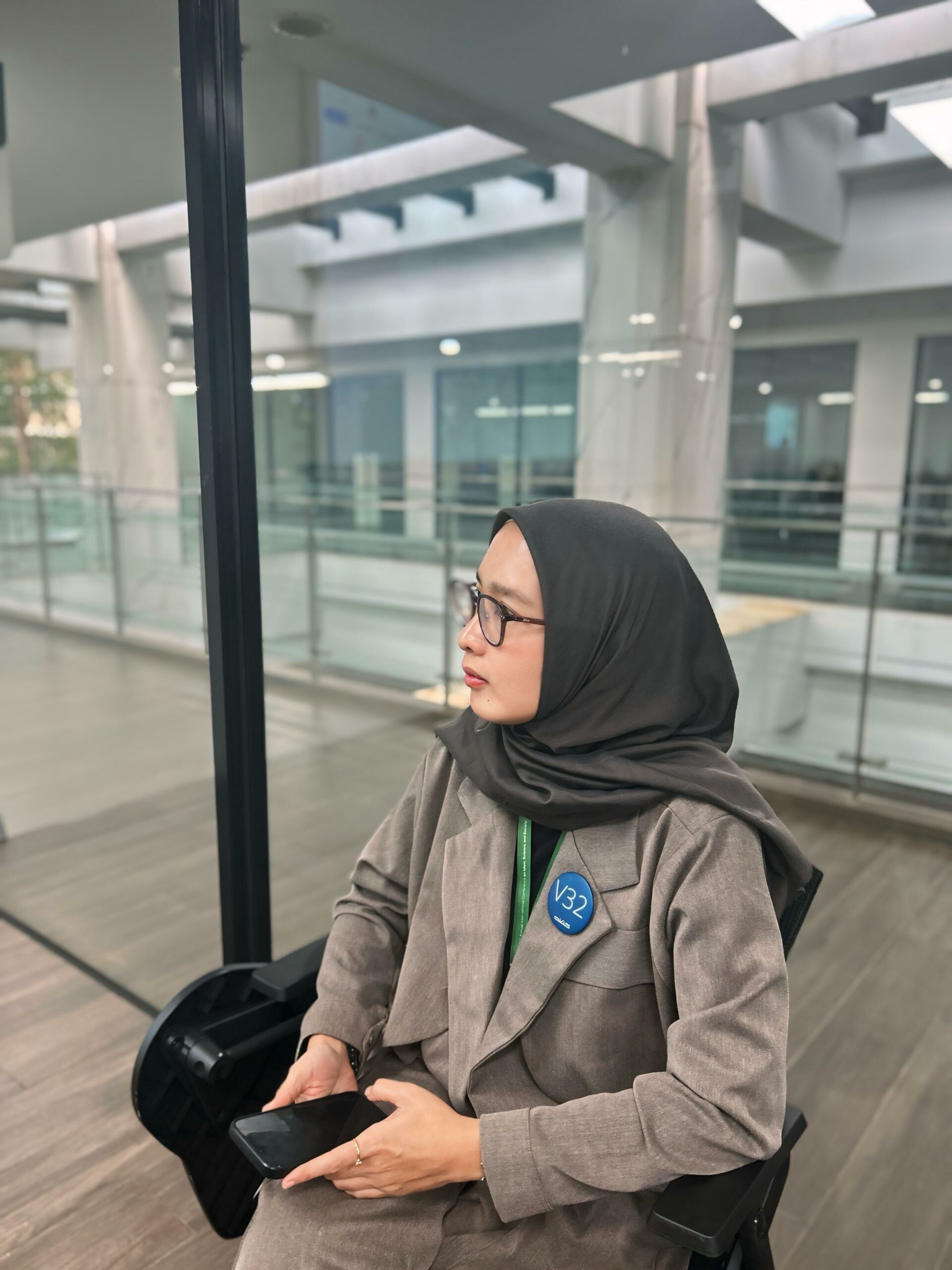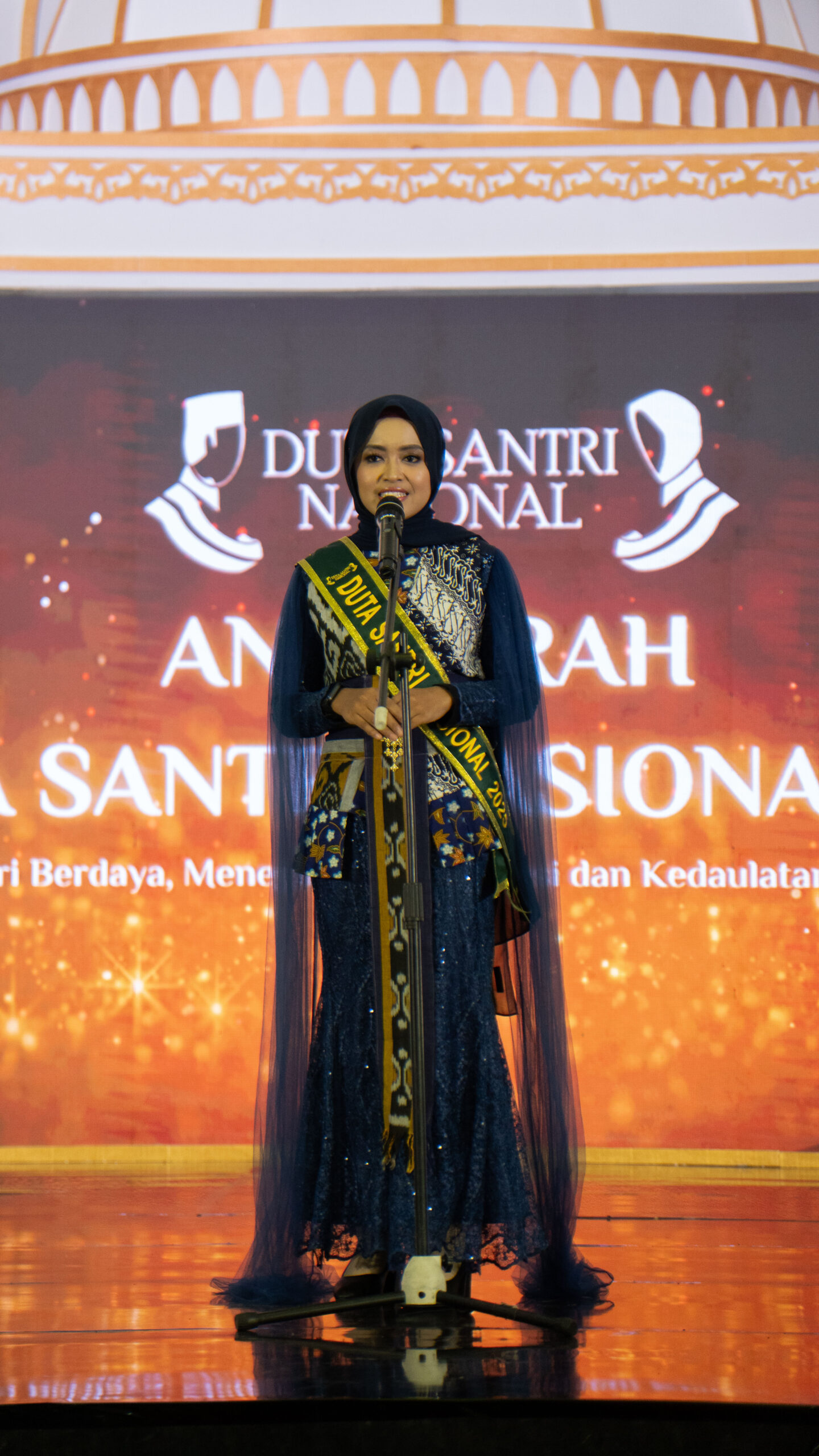Counseling and Mental Health Services (CMHS), Psychoeducation Sessions: Workshop on Mental Health First Aid

CMHS Psychoeducation Sessions
We are pleased to announce that the UIII Counseling and Mental Health Services (CMHS) will organize the Psychoeducation Sessions: Workshop on Mental Health First Aid, which will be held on:
? Date: Friday, December 5, 2025
⏰ Time: 14.00 P.M.
? Venue: Classroom 10, 2nd Floor - Faculty A Building
? Registration: https://s.uiii.id/Psychoeducation_Form
This workshop introduces essential Mental Health First Aid skills, helping participants recognize early signs of distress, offer initial support, and guide individuals toward appropriate professional help with confidence and empathy.
To ensure an effective and well-organized workshop, the participant quota is limited to 10 individuals from each faculty. Slots will be allocated on a first-come, first-served basis.
For further information, please contact us thru e-mail: cmhs@uiii.ac.id or WhatsApp Number +6287787240197 (Meyta)
Guest Lecture: Teacher Certification Assessment

Recorded on YouTube:
https://www.youtube.com/watch?v=LafbU1gwbos
Guest Lecture: Item Analysis and Test Equating

Recorded on YouTube:
https://www.youtube.com/watch?v=vcd8wzQblJc
Growing through Imperfection and Purpose: Reflections on AICIS+ 2025
 Growing through Imperfection and Purpose: Reflections on AICIS+ 2025
Growing through Imperfection and Purpose: Reflections on AICIS+ 2025
By Nanik Yuliyanti
This year, on its 24-year journey, The Annual International Conference on Islamic Studies (AICIS) that initially focused on traditional religious studies, evolved into AICIS+: the Annual International Conference on Islam, Science, and Society. This shift marked a bold new direction toward larger and deeper impact.
For me, it has been an honor to be part of AICIS+ 2025, an experience that was as humbling as it was inspiring. From the moment the conference opened at Universitas Islam Internasional Indonesia (UIII), I felt the weight of its ambition: to bridge Islamic scholarship with science, society, and sustainability (bridging tradition and innovation to shape a better future). This year’s theme, Islam, Ecotheology, and Technological Transformation: Multidisciplinary Innovations for an Equitable and Sustainable Future, resonated deeply with me, not only as a PhD student at faculty of education UIII that juggling with courses and researches, but also as someone who strives to live a meaningful and impactful life.
This was actually my second year engaging with AICIS. Last year, hosted by UIN Walisongo Semarang, I participated as a presenter from UIII. I shared my paper in a panel session and received sharp and intellectually nourishing feedback from two Indonesian professors who served as discussants. This year, I returned in a different role: as an event volunteer and moderator for three panels: Ecotheology and Environmental Sustainability, Decolonizing Islamic Studies, and Peacebuilding and Humanitarian Crisis. Each panel offered rich perspectives, but also revealed the logistical challenges of organizing a conference of this scale. For example, many assigned discussants were absent, and speakers openly expressed their disappointment, having hoped for expert feedback to refine their works.
AICIS+ 2025 was a first for UIII in many ways. It tested the limits of our infrastructure, our coordination, and our capacity to host hundreds and even thousands of scholars and participants from across Indonesia and abroad. And yet, it also revealed our potential. The Rectorate Building, mosque, library, and faculty halls buzzed with energy and authenticity, drawing admiration from participants and guests alike. The sessions were intellectually vibrant, and the side events, from the Edu Expo to the Halal Festival, added layers of engagement beyond the academic. However, since there were many different activities and events held at the same time, the participants as well as the volunteers and organizers were quite hectic and exhausted. At times, the main venue felt unexpectedly quiet, with only a few participants scattered across the space, perhaps a result of simultaneous sessions spread across multiple venues and buildings.

Still, there were valuable moments that prompted reflection. During the panel of Ecotheology and Environmental Sustainability, as also mentioned by Dedi Mulyadi (Governor of West Java) during his last visit to UIII, this university is proudly branded as a green campus, yet many of its buildings are dominated by glass walls with no operable windows. This architectural choice, while visually striking, raises questions about sustainability and comfort. As someone moderating a panel on ecotheology, I couldn’t help but notice the irony. To this extent, I was struck by another reminder that even in our pursuit of innovation, we must remain critical and grounded. In fact, this was not just a critique, but an invitation: come visit UIII, and witness not only its architectural beauty, but also its ongoing efforts to grow toward meaningful innovation and sustainability.
Another valuable lesson I took from this experience is about the importance of empathy. As an event volunteer and moderator, I had to navigate different personalities, expectations, and frustrations. I saw how participants reacted to difficulty in finding the venues, confusing information and instructions, delays, missing discussants, and logistical hiccups. Some were gracious, others were less so. Had I been a participant and presenter, I might have felt the same. But knowing how tirelessly the organizing team worked behind the scenes, I also understood the complexity and constraints we all faced. Moreover, I believe that behind every complaint, there was a desire to be heard, to be valued. And behind every effort from the organizing team, was a commitment to make this conference meaningful and impactful. And speaking from my own experiences, sometimes, I feel like criticism helps us grow faster and stronger than praise or encouragement. It sharpens our awareness and pushes us to transform and improve. So, though it’s not always easy, I believe we should embrace criticism and move forward with it.
Furthermore, I also learned that growth often comes from knowing our limits, and then gently pushing past them. This year, we saw how far UIII could stretch to accommodate a global conference. We saw what worked, and what didn’t. But more importantly, we saw that there is no fixed limit, only opportunities to learn, reflect, and grow.
Last but not least, AICIS+ also made me reflect on Indonesia’s place in the global imagination and perception. Ask someone abroad about Indonesia, and they might say Bali, Borobudur, Monas, or many tropical beaches and islands. Rarely do they mention Islam, despite Indonesia being the largest Muslim-majority country in the world. UIII was built to change that narrative. It aims to become a center of Islamic scholarship that is globally engaged and locally rooted. Through AICIS+, we take one step closer to that vision. It’s a long journey, but not an impossible one.
This year’s conference was not perfect, but it was purposeful. It reminded me that imperfection is not failure, it is feedback and raw material for growth. And when we approach it with humility and hope, it becomes a blessing. To everyone who made AICIS+ 2025 possible, thank you. Thank you for the memories, the lessons, and the teamwork. May our efforts bring new opportunities, deeper understanding, and meaningful impact.
Reading Circle Time with Estudia

?✨ Reading Circle Time with Estudia ✨?
We’re excited to announce the return of Reading Circle Time as the new semester begins! A special welcome to all new UIII students—this is the perfect chance to meet friends, relax, and share your favorite reads.
? When?
Wednesday, November 26
? What time?
4:00 – 4:30 p.m. Silent reading
4:30 – 5:30 p.m. Book discussion
? Where?
UIII roundabout by the male dorm
? Who can join?
- Open to all UIII civitas: students, faculty, and staff are welcome!
- New students—this is a great chance to meet friends and start your semester with inspiring conversations.
? What to bring?
- A book or journal you're currently into or have finished
- Snacks, meals, or your favorite treat
- Your tumbler and food container (let’s go green!)
- Comfy clothes that make you feel good
- Your bright smile and open mind ?
? Let’s create a space where everyone feels heard and appreciated. Be kind, be curious, and let the stories flow!
? Let’s read, share, and grow together—old and new friends alik
Lunch Talk #47: Financing Education in Indonesia: History, Politics, and The Making of Controversy

You are invited to join the Lunch Talk #47 at the Faculty of Education, UIII
Budi Waluyo, PhD (Scholar in Residence (SIR) at the Faculty of Education UIII and Lecturer at Politeknik Keuangan Negara STAN) will share about: "Financing Education in Indonesia: History, Politics, and The Making of Controversy".
This talk examines how education in Indonesia has been financed. It highlights how colonial legacies, political reforms, and institutional designs continue to influence today’s funding debates. It teases the audience to explore the tensions between state control, institutional autonomy, and public accountability, by highlighting how these forces generate controversies over tuition fees and, more recently, free school meals. The session invites participants to reflect on what lessons these patterns offer for UIII in developing a sustainable and equitable financing model.
Day/Date: Tuesday/November 25, 2025
Time: 13.00-14.30 (Jakarta Time)
Place: Theater, Faculty A Building
Online participation:
https://bit.ly/LunchTalkEdu47
E-Certificate is provided
Thank you!
Recorded on YouTube
https://www.youtube.com/watch?v=8p0JRyyrFKk
UIII at the Crossroads: FoE Leads Strategic Discussion on University’s Future

UIII at the Crossroads: FoE Leads Strategic Discussion on University’s Future
November 6, 2025
Contributor: Supriyono | Photo: Atia Adjani
The UIII Faculty of Education (FoE) hosted a thought-provoking roundtable discussion titled “UIII at the Crossroads: Political Support, Financial Sustainability, and Survival Strategies.” The event brought together UIII’s university leaders, faculty members across disciplines, and education staff to engage in a candid reflection on UIII’s current position and future direction as a world-class university with Islamic identity.
The discussion, held at the Rectorate Building, was facilitated by the Faculty of Education as part of its ongoing commitment to fostering intellectual dialogue around institutional development and higher education reform.
In her opening remarks, Prof. Nina Nurmila, PhD, Dean of the Faculty of Education, described the session as a moment of self-reflection and shared vision. She emphasized that UIII’s strength lies in its ability to view itself critically and collectively.
“Today we are not only talking about UIII’s administrative structure or funding model,” Prof. Nina said. “We are talking about ‘us’. To become a world-class university, we must be visionary, but also grounded in our shared values and identity.”

The roundtable featured Dr. Budi Waluyo, Scholar-in-Residence at the Faculty of Education and Associate Professor at the Department of State Financial Management, PKN STAN, as the discussion chair. Drawing from his research on Islamic higher education reform and public management, Dr. Waluyo explored the “existential questions” confronting UIII: existence, identity, and purpose.
He posed a central question that resonated with participants: “Are we fading away, or are we becoming more visible and leading?” Through this question, Dr. Waluyo invited attendees to examine the university’s standing amid evolving political support, increasing financial demands, and the push for autonomy within Indonesia’s Islamic higher education landscape.
Dr. Waluyo’s presentation outlined the critical balance UIII must maintain between state dependency and institutional independence. He highlighted the importance of building sustainable income streams through research collaborations, consultancy, and asset optimization.
“When I first came to UIII, I was mesmerized by the mosque. It embodies the Quranic description of heaven — a dwelling beneath which rivers flow. This truly reflects the spirit of UIII, envisioned as a place where such beauty and serenity can flourish,” Dr. Waluyo said.
“Perhaps it was designed to evoke that very feeling — that upon entering this campus, one feels as though entering paradise. As the architect once envisioned, the mosque should have rivers flowing around it to symbolize heaven itself. Now, it is up to us to bring that vision to life,” Dr. Waluyo added.
Moderated by Dr. R. Alpha Amirrachman, Lecturer at the Faculty of Education, the discussion evolved into a dynamic exchange among participants representing UIII’s various faculties. Conversations centered on political advocacy, talent management, governance reform, and the preservation of Islamic academic identity within global education frameworks.
Through this roundtable, the Faculty of Education reaffirmed its role not only as an academic hub but also as a catalyst for institutional reflection, inviting the broader UIII community to engage in the ongoing question: Where are we heading, and who do we want to be?
source: https://uiii.ac.id/uiii-at-the-crossroads-foe-leads-strategic-discussion-on-universitys-future/
AICIS+ 2025 Wasn’t a Conference, It Was a Statement! A Reflection on how AICIS+ 2025 redefined the future of Islamic Scholarship in Indonesia
 AICIS+ 2025 Wasn’t a Conference, It Was a Statement! A Reflection on how AICIS+ 2025 redefined the future of Islamic Scholarship in Indonesia
AICIS+ 2025 Wasn’t a Conference, It Was a Statement! A Reflection on how AICIS+ 2025 redefined the future of Islamic Scholarship in Indonesia
By Rahayu
Stepping into AICIS+ 2025 as a PhD student at the Faculty of Education, I didn’t just come to observe theories. I came to challenge them, question them, and remix them through the lens of learning, culture, and innovation. Education is not merely a subject I study; it is the space where ideas meet reality, where curriculum shapes consciousness, and where the next generation learns to think, dream, and lead. And trust me, this year’s conference didn’t just match that energy, it amplified it!
Carrying the theme “Islam, Ecotheology, and Technological Transformation: Multidisciplinary Innovations for an Equitable and Sustainable Future”, AICIS+ 2025 brought together a remarkable convergence of Islamic scholarship, science, technology, and social inquiry. The Director General of Islamic Education, Amien Suyitno, emphasized with pride, that AICIS+ 2025 has become the most selective conference in its history because the committee received more than 2,400 abstracts from 31 countries, but only 230 abstracts/scholars were accepted. This really wasn’t simply an academic gathering with scholars; it was a living ecosystem of ideas where faith met futurism, tradition met innovation, and global challenges were tackled with intellect, empathy, and vision.
And thankfully, we’re done with the “separate buckets of knowledge” era; Islam, societal issues, and future-oriented thinking were finally sitting at the same table and talking. We’re indeed bridging disciplines now, welcoming global tech voices, and embracing bold. Instead of treating STEM as a side conversation, AICIS+ 2025 truly brought innovation to center stage, from AI ethics and digital knowledge ecosystems to scientific breakthroughs shaping Muslim communities and global society.
With interdisciplinary panels, forward-thinking researchers, and conversations that connect laboratories to lived realities, AICIS+ 2025 signals a new era: one where Islamic scholarship in Indonesia stands confidently alongside global scientific advancement, not as an observer, but as an active, visionary contributor.

A Moderator Saga: Navigating the Rasch Model Panel
I had the exciting opportunity to serve as the moderator for the Science and Technology panel sessions, which brought together lecturers and invited journal editors from diverse research backgrounds. Some speakers delved into highly specialized topics, including the Rasch model measurement, and presented its applications in educational assessment, psychometrics, and data analysis. Very interesting!
For me personally, the Rasch Model panel I moderated was a standout moment at AICIS+ 2025, it was the only panel dedicated entirely to the Rasch Model during the conference. Again, as a PhD student in the Faculty of Education, I couldn’t believe my luck—this semester, while diving into Educational Assessment and the Rasch Model with our own lecturer in the field, I also accidentally signed up for a moderator of conference that turned out to be pure gold and full of knowledge.
Lesson Learned from AICIS+ 2025
I still remember the very first day of AICIS+ 2025 when the Rector of UIII, Prof. Jamhari, highlighted that this conference was far more than an academic event—it was a center hub of collaboration, dialogue, and intellectual exchange. And this whole experience for me was a powerful reminder that learning doesn’t only happen within the four walls of a classroom, it is beyond that. Observing keynote speakers, participating in panel discussions, and engaging with international top scholars offered a rare chance to see theory and research in action, applied to real-world contexts and global perspectives. I realized that staying curious, being proactive, and learning from others is key because education isn’t just about textbooks and lectures, it’s also about conversations, connections, and the people you meet along the way.
The Journey Was Tough, but I Made It: Thousands of Santri to the National Top 5
 The Journey Was Tough, but I Made It: Thousands of Santri to the National Top 5
The Journey Was Tough, but I Made It: Thousands of Santri to the National Top 5
By Jihan Ariqatur Rafiah
National Santri Ambassadors are a group of young individuals from various Islamic boarding schools and educational institutions across Indonesia who develop and promote pesantren values nationwide. They serve as representatives of santri to spread these values in areas such as religion and education, science and technology, social and community development, politics and law, health and sports, energy and environment, economy and entrepreneurship, culture and tourism, diaspora, and multimedia.
Participating in the National Santri Ambassador (NSA) Competition 2025 was an extraordinary and challenging journey. Honestly, I never imagined I could reach this stage. Out of 5,995 participants nationwide, I managed to enter the top 30 finalists and ultimately became top 5, an achievement that still feels like a dream. I chose to focus on Science and Technology, as I wanted to show that santri can excel not only in religious knowledge but also integrate modern science to benefit the community and the nation.
The long journey began with the document screening stage. At this stage, I had to prepare a complete portfolio, including academic achievements, social activities, pesantren experiences, and various works I had produced, such as scientific articles and science projects. Additionally, I submitted a motivational letter that needed to clearly and honestly explain why I deserved to be a National Santri Ambassador. This stage taught me the importance of presenting oneself sincerely and convincingly, as it reflects one’s ability to communicate potential and achievements.
After passing the document screening, I faced interviews and knowledge tests. The interviews covered topics ranging from religious understanding, national insights, social issues, to the latest developments in science and technology. The knowledge test did not only examine theory but also analytical and problem-solving skills. Another challenge was demonstrating the ability to read the Qur’an with proper tajwid and reading classical Arabic texts (kitab kuning/gundul). For many participants, this was a difficult task as it required focus, precision, and comprehension of classical Arabic. However, my previous pesantren experience became a solid foundation, enabling me to navigate this stage confidently.
 The The next stage was the online bootcamp. Despite being virtual, it was intensive and packed with material on leadership, effective communication, project management, and strategies to influence audiences. This bootcamp became a turning point, helping me realize that being an effective leader is not only about knowledge but also the ability to inspire, listen, and influence ethically. I learned pitching and presentation techniques, including how to craft a compelling story behind a science project to make it understandable to diverse audiences. This was when I started developing the technology project I would present in the finals.
The The next stage was the online bootcamp. Despite being virtual, it was intensive and packed with material on leadership, effective communication, project management, and strategies to influence audiences. This bootcamp became a turning point, helping me realize that being an effective leader is not only about knowledge but also the ability to inspire, listen, and influence ethically. I learned pitching and presentation techniques, including how to craft a compelling story behind a science project to make it understandable to diverse audiences. This was when I started developing the technology project I would present in the finals.
After the bootcamp, I entered the project presentation and pitching stage, a key determinant for entering the top 30. I presented a project that combined modern scientific principles with Islamic values an environmentally friendly technological innovation that could be applied in pesantren or local communities. The biggest challenge was communicating scientific ideas clearly and effectively, so that judges from various backgrounds could understand its vision and impact. This experience taught me that scientific communication must be inclusive, not only for scientists but also for the general public.
Upon reaching the top 30 finalists, I attended a five-day in-person quarantine program. These five days were full of intensive activities that expanded my perspectives. The materials ranged from leadership, religious moderation, and pesantren life, teaching us the importance of personal appearance and visual communication as part of one’s self-presentation. In addition, sessions on public speaking and how to influence taught me how to speak confidently in public, build charisma, and positively influence audiences. These sessions became reflective moments, reminding me that being an ambassador is measured not only by academic ability but also by interpersonal skills and social awareness.
Another significant moment occurred when I reached top 5 finalists and had to answer direct questions from the judges. The question was about bullying in pesantren, a sensitive issue that required careful and empathetic responses. At this point, I was extremely grateful for my studies at the Faculty of Education UIII, especially in the Psychological Education, Human Development, and Well-Being in Education course, where I gained insights into developmental psychology, social dynamics, and strategies to address bullying. This knowledge helped me provide a comprehensive answer, emphasizing the importance of character education, empathy among santri, and a humane approach to creating a healthy and inclusive pesantren environment. It made me realize that classroom learning can be directly applied to real-life challenges.
This NSA experience has taught me many valuable lessons: the importance of thorough preparation, effective communication, leadership skills, cross-cultural collaboration, and how to integrate religious and scientific knowledge for social impact. Each stage, from document screening, interviews, knowledge tests, Qur’an and classical text reading (kitab kuning/gundul), online bootcamp, pitching, to quarantine, has been a profound learning process shaping my character. More than just a competition, it also fostered empathy, the ability to understand others’ conditions and needs, respect differences, and design innovations that truly benefit society. This empathy is not only crucial for santri but also for pesantren stakeholders and any educational institution, so that policies, methods, and learning approaches are better directed, relevant, and responsive to students’ real needs. I carry these lessons into every step of my life: that being a modern santri means competing at the national level, innovating in science, staying true to Islamic values, and caring sincerely for others, with empathy as the foundation of every action.

